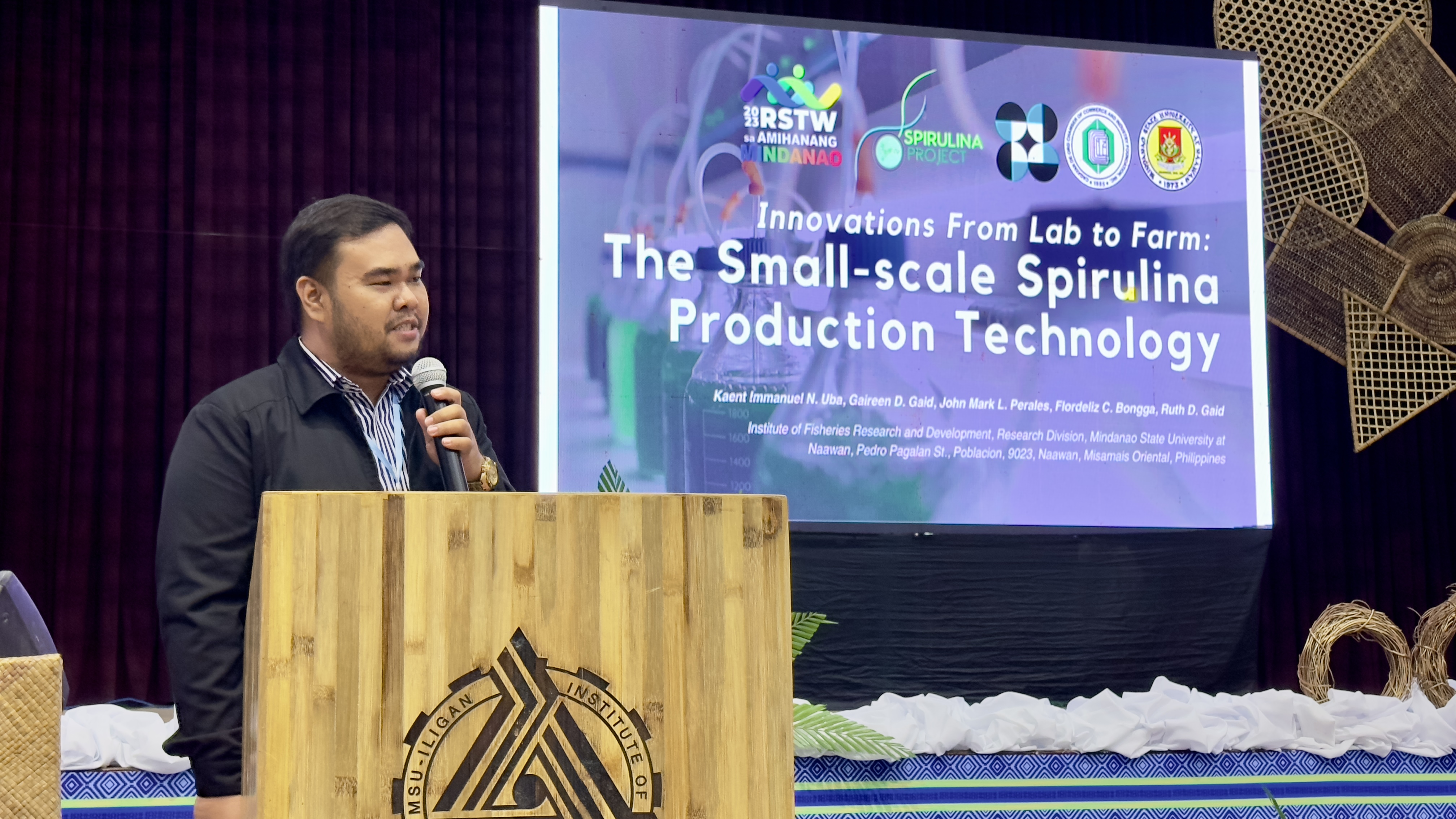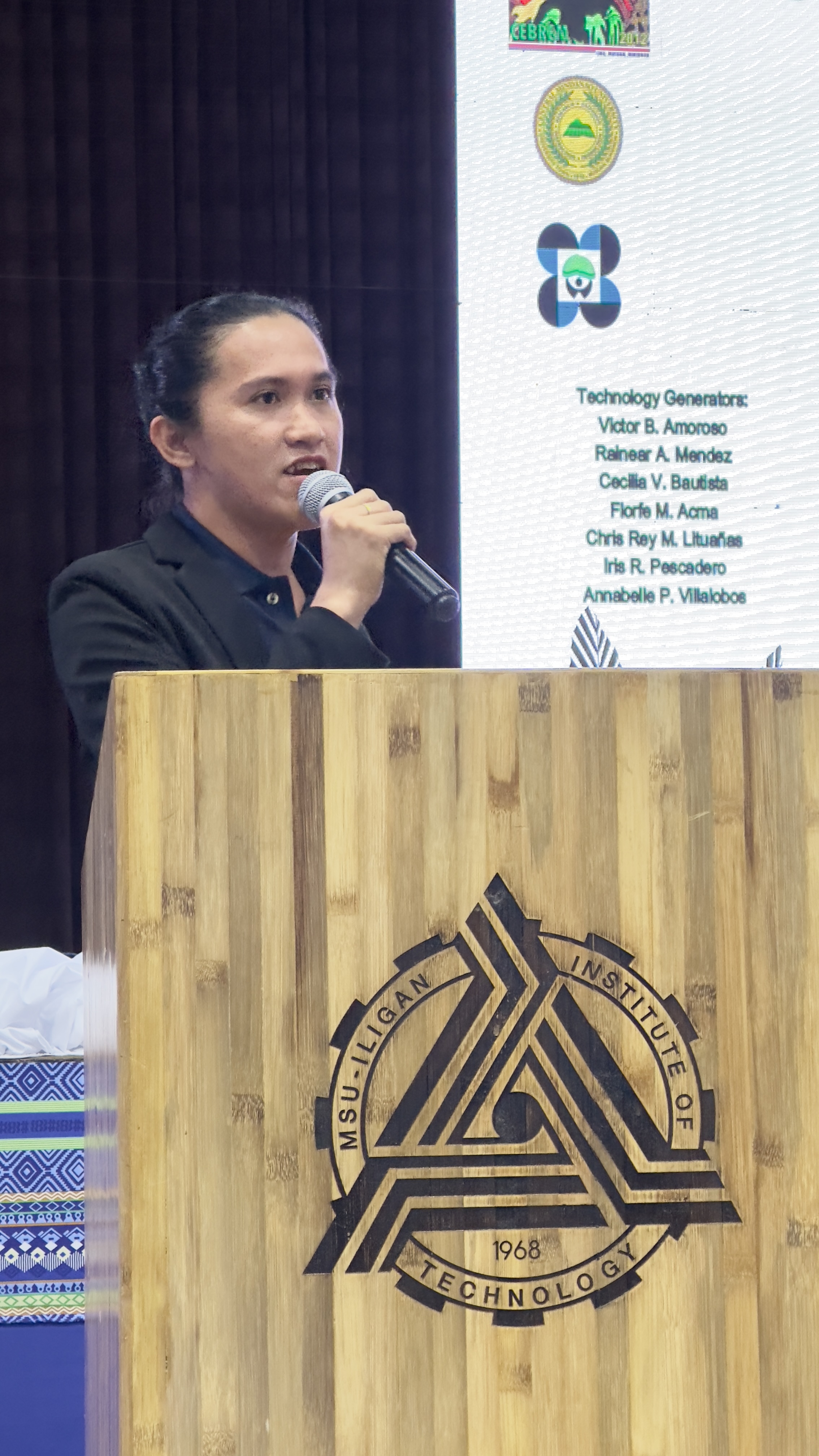For innovation to happen, technologies must be utilized and eventually commercialized. To make this happen, a dynamic pitching session forum was conducted as part of the 2023 Regional Science and Technology Week (RSTW) at Amihang Mindanao located in Mindanao State University-Iligan Institute of Technology (MSU-IIT), Iligan City. Several technologies developed and supported by the Department of Science and Technology (DOST) were pitched during the Entrepreneurs Leveraging Ventures through Adoption of Technologies, A Pitching Session (ELEVATE), which was attended by investors, farmers, and students from region 10.
The Philippine Council for Agriculture, Aquatic and Natural Resources Research and Development of the DOST (DOST-PCAARRD), through the Northern Mindanao Consortium for Agriculture, Aquatic, and Natural Resources Research and Development (NOMCAARRD) and Central Mindanao University (CMU), participated in the 2023 RSTW.

Kaent Immanuel N. Uba of MSU-Naawan presenting the Small-scale Spirulina Production Technology in Northern Mindanao during the technology pitching (Image and caption credit: Erwin Cris D. Valencia)
Among the presented technologies were the DOST-PCAARRD-funded innovations – the Small-scale Spirulina Production Technology, TazSCure: A Natural Fungicide from Tasmannia piperata, and ACTICon®. The presenters were Kaent Immanuel N. Uba of MSU-Naawan, Rienier A. Mendez of CMU, and Irene A. Papa of the National Institute of Molecular Biology and Biotechnology (BIOTECH-UPLB).
Uba discussed the potential of the small-scale spirulina production technology in Northern Mindanao, which offers a 65.22% return on investment and a payback period of 1.82 years. The small-scale production technology can be adopted by local companies and cooperatives to boost spirulina production in the country as it is sustainable, affordable with low-cost culture medium, easily adaptable, and envisions local empowerment and employment. Spirulina is a type of blue-green algae that grows in both salt and fresh water and is considered a nutritional powerhouse and superfood.

Reinier A. Mendez of Central Mindanao University discussing the Tasmannia piperita during the Techno Forum (Image and caption credit: Erwin Cris D. Valencia)
Another technology pitched during the event is the natural fungicide from Tasmannia piperita. Commonly known as “ali” in Bukidnon, T. piperita is rich in antibacterial and antifungal compounds. Mendez presented TazSCure, a natural fungicide formulation using the T. piperita leaf extract, which is an effective and locally available pesticide for vegetables, like tomato and lettuce. According to Mendez, this fungicide has proven its efficacy, which was verified by farmer-cooperators in Lantapan, Bukidnon and Mt. Apo. TazSCure is locally available, safe to humans, environment friendly, affordable, and stable to heat and light.
On the other hand, ACTICon, a natural biopesticide for Cavendish banana, was presented by Irene A. Papa. She mentioned the benefits of using this biopesticide, including controlling Fusarium wilt infestation, lowering mortality rate in banana plantations, and improving plant height and fruit yield, all the while being safe to use. It increases the plant’s vigor and yield by protecting it from the deadly Panama wilt, a disease that has proven lethal against Cavendish bananas. It is meant to serve as a replacement for synthetic chemical pesticides that have harmful side effects on the environment and human health.
The RSTW served as a platform to showcase significant contributions of science and technology to national development and to promote S&T advocacy across the country.
